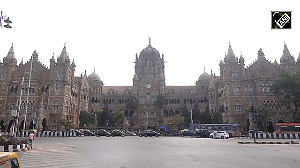The finance ministry’s proposal to recapitalise state-owned banks to offer cheaper loans in the festive season is unwarranted and unwise, notes Somasroy Chakraborty
 In India, the common man is feted every five years, when the general elections are around the corner.
In India, the common man is feted every five years, when the general elections are around the corner.
This time, it’s the middle class. It is being promised cheap money to buy two-wheelers and select consumer products in the traditional festive season that runs to January.
A fortnight ago, the finance ministry even said it would provide additional capital to public sector banks -- that is, over and above the budgeted Rs 14,000 crore (Rs 140 billion) for the current financial year -- to ensure consumer loans are offered at a low rate of interest in the current festive season.
On Tuesday, Finance Minister P Chidambaram reiterated the message in his meeting with public sector banks.
But the banks themselves are notably reluctant to comply.
As executives cynically assure you, strictly off the record, they are wearily familiar with these pre-election gimmicks.
So, though no one has actually gone ahead and cut rates, some of them have pared processing charges fees on loans for cars and two wheelers and packaged them as festive offers but that is as far as they are prepared to extend their largesse.
Perhaps, the fact that the soft-loan capital will be disbursed with retrospective effect has something to do with their reluctance.
Although the budgeted Rs 14,000 crore (Rs 140 billion) money for recapitalisation (this is to meet more stringent Basel III norms) has been allocated among the public sector banks, the additional capital for providing soft consumer loans will be disbursed only later, depending on each bank’s performance.
It is notable that this policy announcement was made with the apparent implicit approval of the Reserve Bank of India Governor Raghuram Rajan -- he was present at the finance ministry meeting that approved the ‘in-principle’ decision to infuse more capital in public sector banks to drive the festive season.
This is the same economist who famously warned of the impact of indiscriminate subprime lending in the US, well ahead of the crash of 2008, and who has made inflation control the centre of his last monetary policy.
The government is somehow convinced that selective low-rate lending will stimulate demand and accelerate economic growth that plunged to a four-year low of 4.4 per cent in the first three months of 2013-14.
But the promise of making consumer loans inexpensive amid rising prices could derail RBI’s aim of keeping inflation under control.
The wholesale price index-based inflation or WPI inflation, which had eased in the first quarter of 2013-14, has started rising again.
The pass-through effect of fuel price increases was compounded by the depreciation of the rupee and rise in international commodity prices.
WPI inflation in September grew at its fastest pace in seven months to 6.46 per cent.
Last month, the RBI increased the repo rate 25 basis points and the central bank conceded that, in the absence of appropriate policy measures, WPI inflation will be higher than initially projected for the rest of the year.
The banking regulator was equally worried that inflation at the retail level, measured by the consumer price index or CPI, remained high, entrenching inflation expectations at elevated levels and eroding consumer and business confidence.
And it is worth noting that only a couple of weeks ago, the RBI clamped down on various schemes -- ranging from zero per cent loans to price discounts on vehicle finance -- that encouraged buyers in taking easy credit to buy consumer goods.
The other point of concern is the rising threat of bad loans that is magnified in an easy money regime.
Already, the net non-performing asset ratio of scheduled commercial banks in India had increased at the end of March, 2013, over the previous year.
Public sector banks saw the maximum rise in the bad loan ratio during this period, by 49 basis points, compared to 6 basis points and 40 basis points for private and foreign banks respectively.
Although the corporate sector is generally blamed for the rise in bad assets, a few large banks, in their recent earnings announcements, mentioned that delinquencies are now being seen in consumer loan portfolios also.
There is no doubt that state-run lenders (as well as private banks) are in need of money to adopt the new Basel III norms that prescribe higher capital requirements for banks.
The capital adequacy ratio of banks in India at an aggregate level had declined 36 basis points at the end of the last financial year.
For public sector banks, it fell even more sharply, by 85 basis points.
According to certain estimates, Indian banks will need around Rs 500,000 crore (Rs 5,000 billion) to comply with the new Basel III norms.
So, if non-performing assets continue to expand, banks face the risk of capital erosion and the requirement of additional capital will keep rising.
This, in turn, could upset the government’s stated agenda of narrowing the country’s fiscal gap.
Further, the availability of cheap credit will not necessarily lead to higher loan demand since consumer and business confidence remains insipid in the current uncertain macroeconomic environment.
And finally, a little bit of recent history will explain the perils of indiscriminate lending policies.
More than five years ago, in June 2008, P Chidambaram touched down on the outskirts of Bengaluru to meet a diverse crowd of grape, flower and mulberry farmers with a promise that their unpaid loans would be waived, an announcement that was made in the 2008-09 Budget.
Chidambaram, closely followed by a battery of journalists, then braved the dusty roads in a shiny BMW to visit some of the rural branches of public sector banks.
He examined the records and extracted assurances from branch managers that the loan waiver process would be hassle-free for the local kisans.
The scheme was a gift from the ruling United Progressive Alliance.
It probably helped the coalition regain Raisina Hill a year later.
But the massive subsidy burden of unpaid farm loans devolved on taxpayers.
Cheap consumer loans pose the same risks at a time when the Indian banking system can least afford it.













 © 2025
© 2025